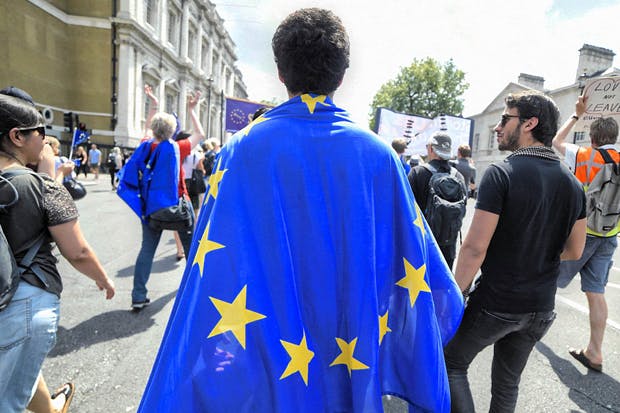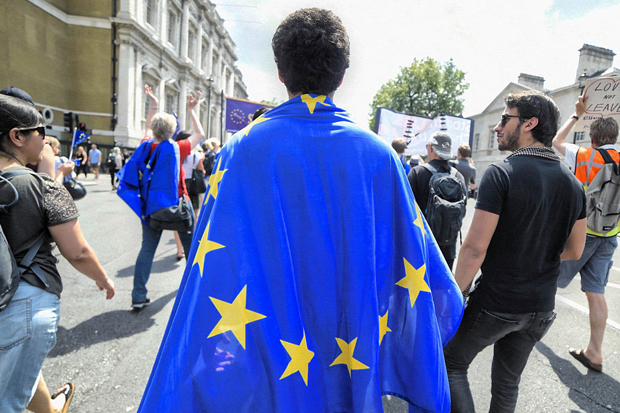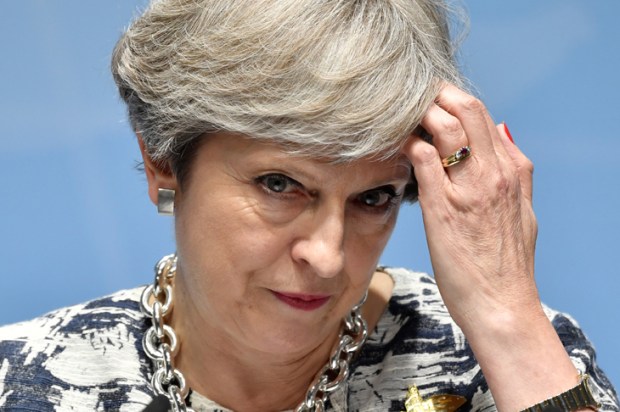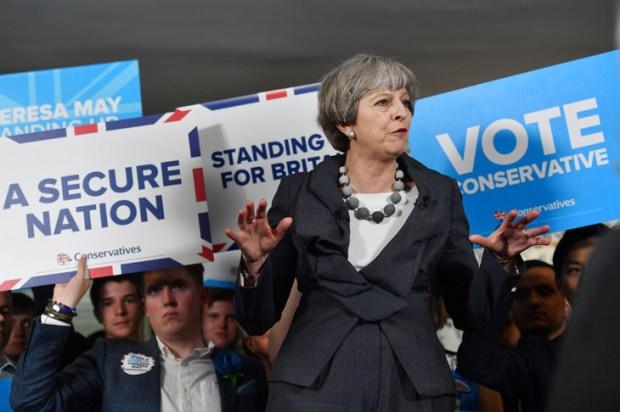Brexit Britain fills me with calm. Six weeks on, there’s no point pretending otherwise. Losing is far better than winning. I am filled with enormous serenity at the thought of this terrible, terrible idea being not my fault at all.
I didn’t expect to feel this way. Although there were signs, now I think back, on the night of the vote. I was at Glastonbury, obviously. (‘Of course you were!’ cried Rod Liddle, when I saw him a few weeks later.) Of course I was. There, with the rest of the metropolitan, liberal, bien-pensant yadda yadda. I found out at about 2 a.m., after a pleasant evening doing pleasant Glastonbury things. I’d wandered backstage, to meet a journalist friend who had secured access to Wi-Fi and a television.
‘It’s all fucked,’ she said. ‘It’s definitely happening.’
‘Jeez,’ I said, or words to that effect. And then we spoke of the miserable future. Of a nation shamed, and racists vindicated, and countrymen which, in hindsight, it turned out we didn’t understand at all. All that fun Remain stuff.
After a while, though, my friend fixed me with a look. ‘You do not,’ she said, quite accusingly, ‘seem very sad.’ And I thought about this, and I realised she was right. ‘It’s probably because I’m wasted,’ I told her. ‘Or in denial. Or Scottish.’ Although it wasn’t. I see that now. It was something else.
I was sad afterwards, obviously. I went home, sobered up, wrote the odd column, did the odd TV appearance, and my approach, I think it is fair to say, was morose. There were practical reasons for this, obviously, but at heart probably was a sense of rejection. Don’t play your tiny violins at me; I’m just saying. After all, wasn’t that what I was supposed to feel? A million times, by then, I had read that Brexit wasn’t about immigration, wasn’t even about Europe, but was actually a blow struck against precisely the sort of aloof, condescending, bubble–dwelling media-politico idiot that the comments under my articles ceaselessly tell me I am. Admittedly, it was invariably other bubble-dwelling media-politico idiots writing this. Still, I did worry they might have a point.
It didn’t last, that sadness. I felt the shift first of all at The Spectator’s summer party in July. I’d expected to feel awkward there, as a woebegone, defensive Remainer, surrounded by Britain’s Brexit elite. Gradually, though, I began to realise that this wasn’t how Britain’s new political dynamic worked. Contrary to my expectations, it was me who made other people feel awkward; the pressure was all on them. And in the weeks since, I’ve felt that dynamic again and again. You can always tell now, with people who voted out. They don’t need to say a word. It’s all in the haunted eyes. The shifty silence. They’re worried. It’s their world now. It’s all down to them.
Although not down to me. To borrow McNulty’s glorious phrase from The Wire (and Remainers have all watched The Wire), ‘This shit ain’t on me.’ I told you this was a bad idea, and you didn’t listen. As yet, we cannot know precisely how Boris Johnson’s vision of Brexit differs from that of Liam Fox or David Davis or Jeremy Corbyn or Theresa May, but the one thing they all have in common is that none of them are in any way my fault.
Only now, post-Brexit, do I truly understand what it means to be part of the elite. It means complicity. It means, whatever your view of this policy or that, or this politician or that, you still possess a vague, unavoidable connection to the way things are. Some fight to be a part of it, others are born to it and fight to leave. It doesn’t make much difference. You’re part of the mob that runs Britain, and thus responsible for how Britain is being run.
Well, not any more. I can’t be held responsible for all this. I hope Brexit goes well, and I’m worried it won’t, but this shit ain’t on me. That’s what I felt, under the stars of Glastonbury, when I inexplicably failed to be sad about something I remain convinced is totally awful. Liberation. Relief. A glimmer of a future in which, for the first time in my supposedly privileged, bubble-dwelling life, I could not be held accountable, even tenuously, for the country going to the dogs. And who knows, maybe that’s how David Cameron now feels too. Although it actually is all his fault, so he shouldn’t.
Definitely Maybes
What, though, are we to call the followers or policies of Theresa May? Assuming, obviously, that there one day are some. At least one columnist last week used ‘Mayist’, which seems to me a terrible, boring waste. Surely we can do better than that? On Twitter, I idly suggested ‘Mayan’ which I still feel is sure to come into its own in the coming economic apocalypse. Thereafter, others weighed in.
‘Mayite’ is no better than ‘Mayist’ and makes you sound like a Geordie when you say it, anyway. ‘Mayflowers’ could work. What with Brexit, ‘Maypoles’ might confuse people. ‘Mayonnaise’, as in ‘the Mayonnaise Government’ is perhaps a bit too weird. ‘The Darling Buds Of May’ might have worked a hundred years ago, but these days sounds obsequious enough to prompt vomiting. ‘The Maytriarchy’ is pretty clever, but far too Guardian.
‘DisMay’ and ‘Mayhem’ don’t really work as collective nouns. ‘Mayors’ would make people think of John Major and Boris Johnson all at once: avoid. ‘Mayonets’ has a nice edge to it though. Or maybe just ‘Maybes’? Maybe it’s ‘Maybelline’.
Got something to add? Join the discussion and comment below.
Get 10 issues for just $10
Subscribe to The Spectator Australia today for the next 10 magazine issues, plus full online access, for just $10.















Comments
Don't miss out
Join the conversation with other Spectator Australia readers. Subscribe to leave a comment.
SUBSCRIBEAlready a subscriber? Log in